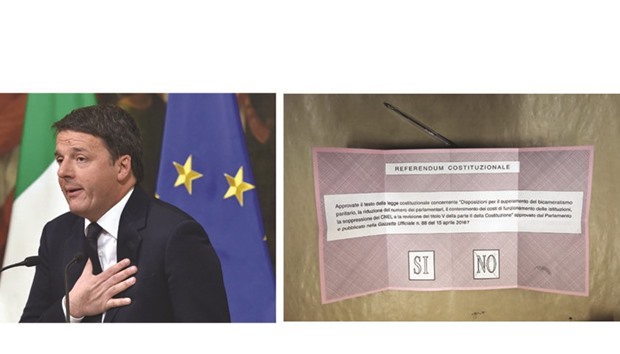Italian Prime Minister Matteo Renzi is set to resign after suffering a crushing defeat in a referendum over constitutional reform, tipping the eurozone’s third-largest economy into political turmoil.
His decision to quit after just two-and-a-half years in office deals a blow to the European Union, already reeling from multiple crises and struggling to overcome anti-establishment forces that have battered the Western world this year.
Renzi’s emotional, midnight resignation announcement sent the euro lower and jolted stock and bond markets on concerns that early elections could follow, possibly paving the way for an anti-euro party, the Five-Star Movement (M5S), to come to power.
Financial markets bounced back later in the morning as European officials played down the prospect of a broader eurozone crisis, but Italy’s fragile bank sector had dropped more than 4.7% at 1320 GMT.
European Commissioner for Economic and Financial Affairs Pierre Moscovici dismissed talk of a eurozone crisis, and German Finance Minister Wolfgang Schaeuble urged calm.
Both said Italy’s institutions are capable of handling a government change, which would be its 64th since 1946.
Economy Minister Pier Carlo Padoan, who has pulled out of meetings with European finance ministers in Brussels this week, is viewed as a possible candidate to replace Renzi.
Senate President Pietro Grasso and Transport Minister Graziano Delrio have also been tipped as possible successors.
It is unclear if Renzi will have enough support in his Democratic Party (PD) to remain party leader – a role that could give him a say in who becomes the next prime minister.
The government crisis could open the door to elections next year and to the possibility of the opposition M5S gaining power in the heart of the single currency area.
M5S, which campaigned hard for a “No” vote, wants to hold a referendum instead on membership of the euro.
“I take full responsibility for the defeat,” Renzi said in his late-night speech.
“I will greet my successor with a smile and a hug, whoever it might be,” he said, struggling to contain his emotions when he thanked his wife and children for their support.
“We are not robots,” he said at one point.
Sunday’s referendum was over government plans to reduce the powers of the upper house Senate and regional authorities but was viewed by many people as a chance to register dissatisfaction with Renzi, who has struggled to revive economic growth, and mainstream politics.
“No” won an overwhelming 59.1% of the vote, according to the final count.
About 33mn Italians, or two-thirds of eligible voters, cast ballots following months of bitter campaigning that pitted Renzi against all major opposition parties, including the anti-establishment M5S.
The euro briefly tumbled overnight to 21-month lows against the dollar, as markets worried instability could deal a hammer blow to Italian banks, which are looking to raise around €20bn ($21bn) in coming months.
However, by early in the European morning it had largely rebounded.
Italy’s banks are weighed down by more than €350bn of bad loans.
President Sergio Mattarella will consult with party leaders before naming a new prime minister – the fourth successive head of government to be appointed without an electoral mandate, a fact that underscores the fragility of Italy’s political system.
In the meantime, Renzi would stay on as caretaker.
During the meeting between the leaders, Mattarella asked Renzi to delay his resignation until the budget has been passed by parliament.
The new prime minister, who will need the backing of Renzi’s PD to take office, will have to draw up a new electoral law, with M5S urging a swift deal to open the way for elections in early 2017, a year ahead of schedule.
“From tomorrow, we will start work on putting together M5S’s future programme and the team of people that will make up a future government,” said Luigi Di Maio, tipped to be the group’s prime ministerial candidate.
Opinion polls put M5S neck-and-neck with the PD.
Renzi, 41, took office in 2014 promising to shake up hidebound Italy and presenting himself as an anti-establishment “demolition man” determined to crash through a smothering bureaucracy and reshape creaking institutions.
However, his economic policies have made little impact, and M5S has claimed the anti-establishment banner, tapping into a populist mood that has seen Britons vote to leave the European Union and Americans elect Donald Trump president.
In a moment of relief for mainstream Europe, Austrian voters on Sunday rejected Norbert Hofer, vying to become the first freely elected far-right head of state in Europe since World War II, choosing a Greens leader as president instead.
But elsewhere, the established order is in retreat.
French President Francois Hollande said last week that he would not seek re-election next year, and even German Chancellor Angela Merkel looks vulnerable as she seeks a fourth term in 2017.

(Left photo) Renzi: I take full responsibility for the defeat. (Right photo) A picture shows a ballot with a cross on the ‘NO’ during the counting of the vote for a referendum on constitutional reforms, late on Sunday in a polling station in Saluzzo, near Turin. Italian voters on Sunday overwhelmingly rejected constitutional reform proposals on which Prime Minister Renzi has staked his political future.
